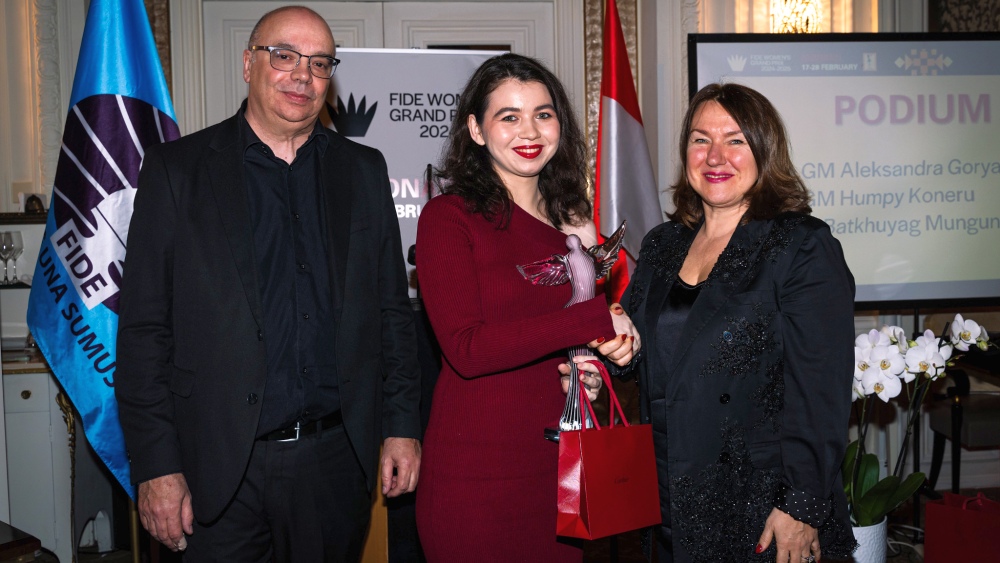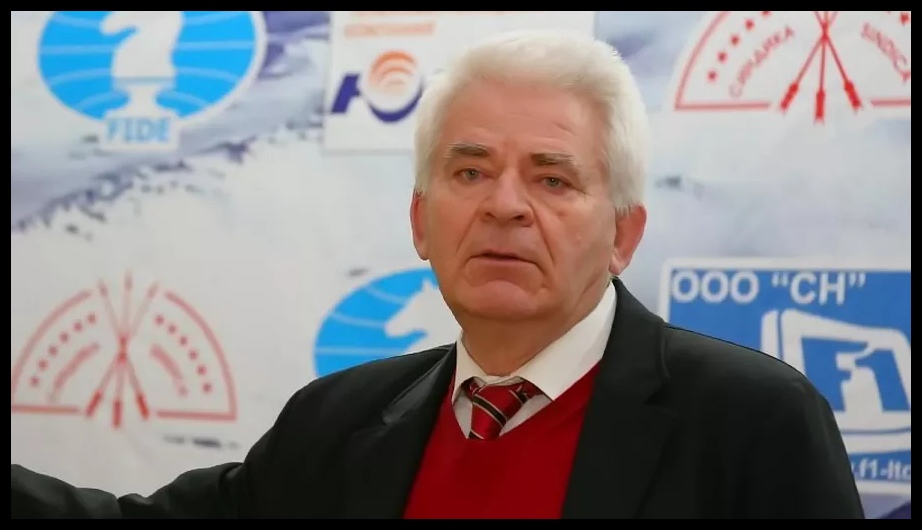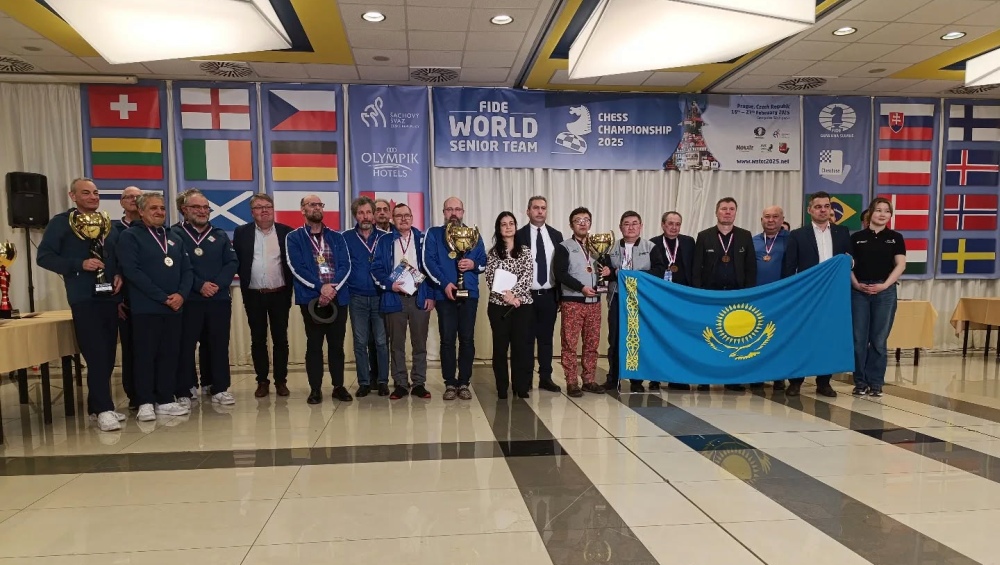Goryachkina clinches second FIDE WGP 2024-2025 title in Monaco after dramatic finale

We have reached the end of a spectacular Grand Prix leg in Monaco, filled with intense battles, unexpected turns, and a newly crowned champion. After nine grueling rounds, three players—Aleksandra Goryachkina, Batkhuyag Munguntuul, and Humpy Koneru—finished tied for first place. However, it was Goryachkina who emerged as the tournament winner, securing her second Grand Prix leg victory, thanks to the superiour Sonneborn-Berger tiebreak. The final round delivered high-stakes drama, with Munguntuul and Goryachkina drawing their encounter, allowing Humpy Koneru to join them at the top after defeating Bibisara Assaubayeva. Meanwhile, Alexandra Kosteniuk bounced back with a victory over Elisabeth Paehtz, Tan Zhongyi and Harika Dronavalli drew, and in a shocking twist, Sarasadat Khademalsharieh defeated Kateryna Lagno, dashing her hopes for the title. Yesterday’s results had already reshaped the leaderboard, with Goryachkina and Munguntuul catching up to Lagno, setting up a final-round showdown. The stakes were high: a win in Munguntuul-Goryachkina would likely secure first place for the winner, while Lagno needed a victory against Khademalsharieh to stay in contention. With everything on the line, the last round was a fitting climax to an unforgettable event. Round 9 results Batkhuyag Munguntuul 1/2-1/2 Aleksandra GoryachkinaAlexandra Kosteniuk 1-0 Elisabeth PaehtzTan Zhongyi 1/2-1/2 Harika DronavalliHumpy Koneru 1-0 Bibisara AssaubayevaSarasadat Khademalsharieh 1-0 Kateryna Lagno Batkhuyag Munguntuul – Aleksandra Goryachkina This was the game everyone had their eyes on. The tournament’s bottom seed, Batkhuyag Munguntuul, delivered a phenomenal performance in Monaco, while Goryachkina, the winner of the previous Grand Prix leg, fought her way to the top after an early setback in round one. A victory for either would have secured at least a shared first place, while a draw would have left the final standings uncertain, depending on Lagno’s result. The opening choice—a Berlin Defense in Ruy Lopez—was particularly interesting, as it is known for its drawish tendencies. However, throughout this tournament, we have seen dynamic interpretations of this setup, and this game was no exception. Both players sought complications, but multiple exchanges eradicated any attacking chances, leading to a draw. Goryachkina remains the clear favorite in the overall Grand Prix standings and will play her third and final leg in Cyprus (March 14-25). Will she cement her place at the top? Meanwhile, Munguntuul, who had a tough start in Shymkent but shone in Monaco, will return for the Indian leg (April 13-24). What will her third appearance bring? Alexandra Kosteniuk – Elisabeth Paehtz A King’s Indian Defense quickly turned favorable for White, both on the board and on the clock. Alexandra first advanced on the queenside, securing a strong outpost for her knight, and then took full advantage of Black’s passive pieces and ill-timed counterplay on the kingside. Both players have not had great time management in this tournament, and today they exchanged long tanks – for more than 20 minutes at some points. A key moment came at move 18 when Black faced a recapture dilemma: Kosteniuk noted in her post-game interview that King’s Indian players instinctively want to recapture on f5 with a pawn, but here, Black’s passive position demanded either 18…Bxf5 or 18…Nxf5 instead. After further simplifications, White’s advantage became undeniable due to Black’s misplaced pieces and weak pawn structure. The game concluded with a tactical shot following 36. Bb4, making White’s passed a-pawn a decisive factor. Paehtz, understandably determined to win, took risks, but Kosteniuk—bouncing back from her previous loss—remained composed and converted the advantage. Paehtz started the tournament strongly but lost momentum. However, with her next appearance in Cyprus, she has the opportunity to regain her form. Meanwhile, Kosteniuk will return for the final Grand Prix leg in Austria. Tan Zhongyi – Harika Dronavalli Both players entered the round with confidence after winning their previous games. While neither had a standout tournament, ending on a strong note was crucial—especially for Harika, who will play in Cyprus next, and Tan, who is set to challenge the Women’s World Champion in just four weeks. Tan, trailing the leaders by just half a point, still had an outside chance of winning, making this game all the more significant for both players. It began with a Sicilian but quickly deviated from mainline theory. White appeared more comfortable in the resulting closed position, securing a strong outpost knight. However, her other pieces were passive, preventing any decisive breakthroughs. As the game progressed, Black found chances for a kingside initiative, but the position remained balanced. Eventually, the queenside opened up, leading to multiple exchanges and leaving Black with a passed a-pawn. Dronavalli could have forced a draw by trading queens but opted to continue, given her slightly more active pieces. Despite Black’s winning pawns, the ensuing complications allowed Tan’s queen to remain a constant threat. Ultimately, the game ended in a hard-fought draw. Tan will soon be in China for the World Championship match before returning for the Grand Prix final leg in Austria (May 6-17)—will she compete as the newly crowned World Champion? Meanwhile, Harika, despite an underwhelming performance in Monaco leg, will have two more chances to shine in Cyprus and India. Humpy Koneru – Bibisara Assaubayeva Trailing the leaders by half a point, Humpy had every reason to go all in, and that’s precisely what she did. Her opponent, Assaubayeva, struggling with health issues and sitting at the bottom of the standings, was likely not at her sharpest. An early mistake cost her a pawn, and from there, Humpy dictated the game. Here, instead of 11…c6 or 11…Nh5 Black played 11…Nd7?, allowing 12. Qxd8 Rxd8 13. Nb5, attacking the c7-pawn. Despite being down material early, Assaubayeva fought on, posing as many problems as possible. However, Humpy’s experience prevailed, and she secured a critical victory, joining the tournament leaders. This was Assaubayeva’s final Grand Prix leg, while Humpy will return to compete in India, playing on home turf. Sarasadat Khademalsharieh – Kateryna Lagno Lagno had led the tournament for multiple rounds and played a quick draw on the previous day. But with her co-leaders facing off, she needed a win. Unfortunately, pushing
Boris Spassky (1937–2025)

FIDE is deeply saddened by the passing of Boris Spassky, the tenth World Chess Champion, at the age of 88. Spassky was born in 1937 in Leningrad and recognized as a chess prodigy from an early age. He earned the Grandmaster title at 18 and made his Candidates Tournament debut in 1956 (Amsterdam) at 19. Though Spassky showed immense promise, he missed the next two World Championship cycles after failing to qualify for the Interzonals. However, he resumed his quest for the chess crown eight years later. After defeating Keres (1965), Geller (1965), and Tal (1965) in the Candidates matches, Spassky earned the right to challenge Tigran Petrosian for the world title. Though Boris lost the 1966 match in Moscow, he fought his way back and, three years later, defeated Petrosian in their rematch (Moscow, 1969) by a score of 12½–10½, becoming the tenth World Chess Champion. Spassky held the title until 1972, when he famously lost to Bobby Fischer in Reykjavik, one of the most iconic matches in chess history. A symbol of rivalry between the USA and USSR during the Cold War, the “Match of the Century” was held in Reykjavik, Iceland, and boasted a record-breaking prize pool of $250,000, dwarfing other sports’ rewards. The showdown between an American and a Soviet drew unparalleled media coverage, with major outlets present. The match was broadcast to 50 million viewers. The contest lasted 21 games, and Fischer won 12½ to 8½, becoming the eleventh World Chess Champion. This victory propelled chess into the mass media spotlight. Spassky continued competing at the highest level, notably reaching the Candidates semifinal in 1974 and the final in 1977. A two-time USSR Champion (1961 and 1973), Spassky played for the Soviet team in seven Chess Olympiads (1962–1978), winning thirteen medals (team and individual) and scoring 69 points in 94 games (+45−1=48). An independent spirit and true chess artist, Spassky felt constrained by the Soviet system. In 1976, he emigrated to France with his third wife, became a French citizen in 1978, and later represented France in three Olympiads (1984–1988) on board one. In 2012, Spassky returned to Russia. The first genuinely universal player, Spassky was not an opening specialist, but he excelled in complex and dynamic middlegame positions, where he was in his element. FIDE extends its sincere condolences to Boris Spassky’s family, friends, and loved ones.
PDC webinar on 2025 FIDE Funding Guidelines announced

Dear FIDE members, We are happy to announce that FIDE starts its Planning and Development Funding programme 2025 cycle on the 1st of March 2025. All beneficiaries entitled to the funding programme are welcome to submit their requests for 2025 development projects. FIDE PDC has published the new 2025 FIDE Funding guidelines with some adaptations and amendments of 2025 here: https://pdc.fide.com/guidelines2025/. We would like to invite you to the FIDE PDC Webinar initiated to discuss the new guidelines with amendments, new application procedure, format of applying for funds and other important changes related to the FIDE Planning and Development programme and procedure. The FIDE PDC Webinar will take place on March 03, 2025, at 14.00 pm CET via ZOOM platform. Link to the webinar is below: us06web.zoom.us/j/83941940294?pwd=a9WxS5mqbC3q4fPN0saPNqC1RxEF7k.1 Meeting ID: 839 4194 0294Passcode: 801501Topic: FIDE PDC Funding Programme 2025 – start of the cycleTime: Mar 3, 2025 02:00 PM Paris Tap mobile +15074734847,,83941940294#,,,,*801501# US+15642172000,,83941940294#,,,,*801501# US Dial by your location +1 507 473 4847 US• +1 564 217 2000 US• +1 646 876 9923 US (New York)• +1 646 931 3860 US• +1 669 444 9171 US• +1 669 900 6833 US (San Jose)• +1 689 278 1000 US• +1 719 359 4580 US• +1 253 205 0468 US• +1 253 215 8782 US (Tacoma)• +1 301 715 8592 US (Washington DC)• +1 305 224 1968 US• +1 309 205 3325 US• +1 312 626 6799 US (Chicago)• +1 346 248 7799 US (Houston)• +1 360 209 5623 US• +1 386 347 5053 US• +1 408 638 0968 US (San Jose) Meeting ID: 839 4194 0294Passcode: 801501 Find your local number: https://us06web.zoom.us/u/kgAfCsiXP Looking forward to seeing you at the webinar, FIDE PDC Team
WSTCC 2025: USA and England crowned champions

From February 16–27, 2025, Prague hosted the World Senior Team Chess Championship. After over ten days and nine exciting rounds, the champions emerged in every category. 50+ Category Top-seeded USA (GM Ehlvest, GM Kaidanov, GM Shabalov, GM Novikov, and IM Rachels) secured first place in the 50+ competition, finishing with 15/18 points after defeating Confluentia in the final round. Team Italy (GM David, GM Godena, IM Bellini, IM Bellia, and IM D’Amore) also won their last match, equaling the USA’s score but had to settle for silver due to inferior tiebreaks (game points). Kazakhstan (GM Kazhgaleyev, GM Kotsur, GM Temirbayev, IM Tikzhanov, and IM Min), who led the event after eight rounds, faced a tough last-round pairing against England 1. After tense battles on all four boards, the match ended in a draw, leaving Kazakhstan with bronze, while England 1 finished in fourth place. Several players had a truly amazing event and delivered outstanding performances. GM Michael Adams scored 6.5/8 on the top board, only losing to GM Ftacnik in round seven, earning him the gold medal for board one. GM Alexander Shabalov (USA) claimed gold on board three. GM Mark Hebden (England) dominated board four. IM Carlo D’Amore greatly contributed to Italy’s success, winning the reserve board medal. Final standings 50+ England 1 (GM Nunn, GM Flear, GM Kosten, IM Large, and FM Chapman) dominated the 65+ category from start to finish, playing on the top board from round two onwards and conceding only two match draws. Lasker Schachstiftung GK (GM Knaak, GM Jussupow, GM Meister, and Dr. Koehler), the top-seeded team, remained undefeated but managed only five match wins, finishing second. Germany’s Saxonia secured the bronze medal. Final standings 65+ Legendary GMs Rainer Knaak and Artur Jussupow convincingly won their respective frist and second boards. FM Mario Sibilio played amazing chess and delivering exceptional performance on board three. IM Large (England 1), scored an impressive 7/8, becoming the best performer on board four. The medal for the reserve board goes to IM Giffard of France 1. The women’s teams competed in the same pools as the men but were ranked separately. In the 50+ category, Czech Republic claimed gold, finishing ahead of China (silver) and the USA (bronze). In the 65+ category, Latvia took first place, followed by Czech Republic (silver) and Poland (bronze). This event once again proved that age is just a number, but chess is timeless. Follow us on Instagram and Facebook. Official website: https://www.wstcc2025.net/ Photos: Ave Chess and Mark Livshitz

